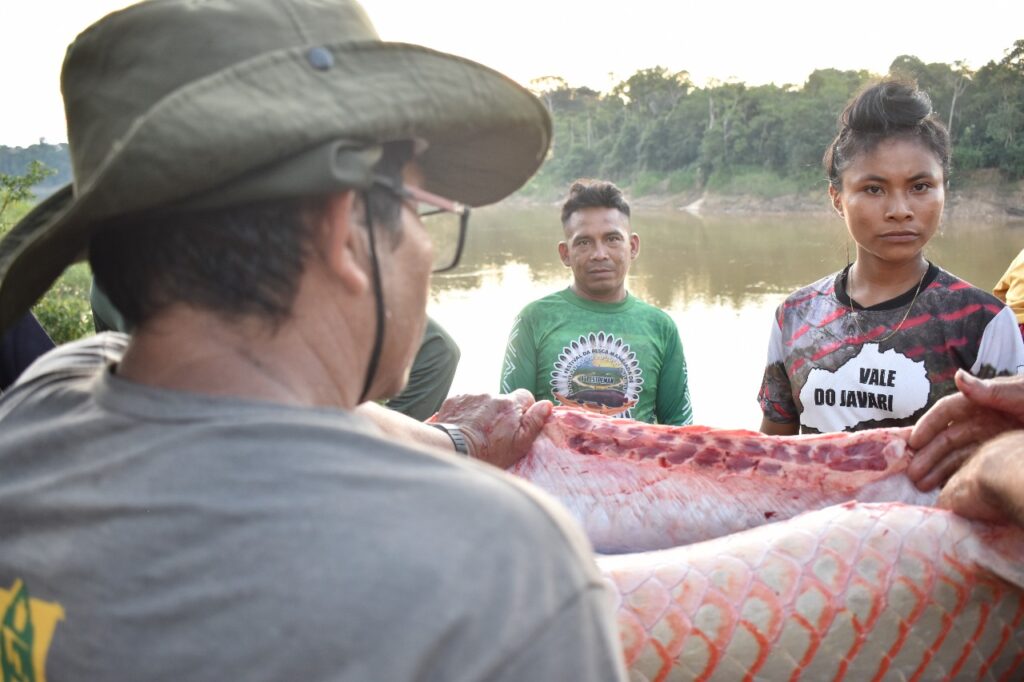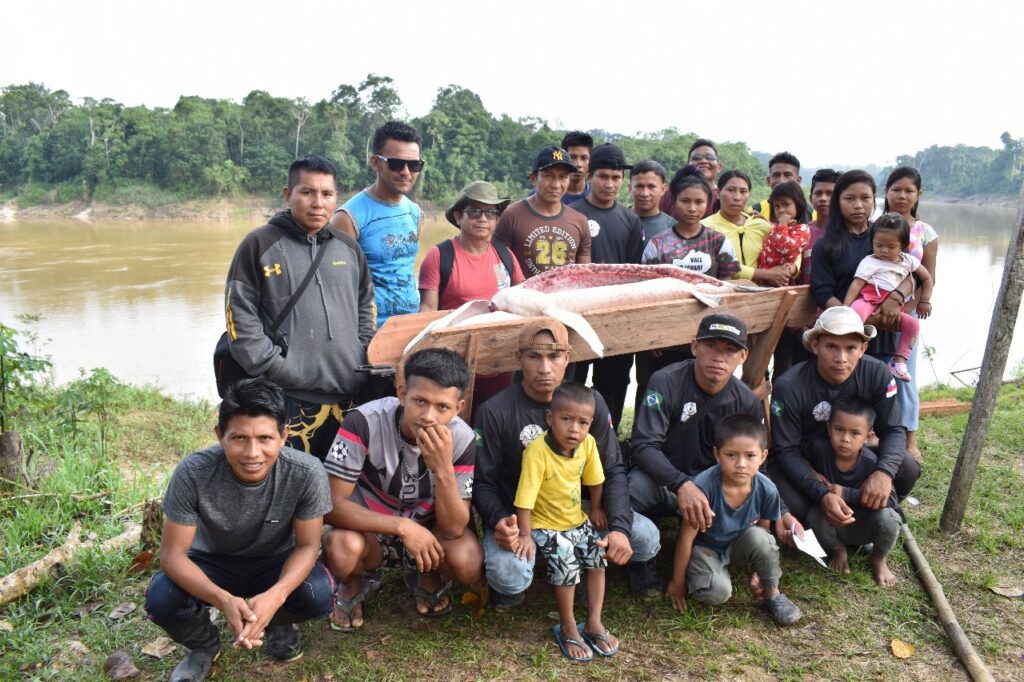The indigenous peoples come together to strengthen the management of the pirarucu in the Vale do Javari
The people of Them, and Mayuruna received the indigenous people of the Paumari for the exchange of experience on sustainable management of the fish
AI generated audio
By Talita Oliveira | OPAN
For the sustainable management of the pirarucu fish became a reality for the people of the Paumari of the Tapauá river, in the south of the Amazon river. The practice will not only recovered, the population of fish and other species, but it also brought with it a number of benefits, environmental, and socio-economic challenges in their communities. With over a decade of experience, started an exchange with the manager of the Sustainable Development Reserve (RDS), Mamirauá, the Paumari became a pioneer in the implementation of the management of the pirarucu fish on the Lands of Indigenous peoples, has inspired local communities in the region, and the indigenous peoples in other regions.
- Find out more: ‘the sustainable use of the pirarucu fish: the 25 years of legacy of conservation’
- Learn more in: A decade of fishing for arapaima of the people, the Paumari’
From 2020 on, the people of Them, and Mayuruna, in the Vale do Javari Indigenous territory, in the extreme west of the Amazon river, they seek the support of the Paumari, to strengthen their own management practices. To meet this demand, the Centro de trabalho Indigenista (CTI) has engaged in a dialogue with the Operation of the Amazon-Native (OPAN), and the Association of the Indigenous People of the Water, (AIPA), with the goal of organizing the exchange of knowledge among the people.
The tour initially scheduled for 2022, has been postponed due to the tragic murder of the indigenous peoples, Bruno Pereira, a journalist’s Dom Phillips. By 2024, the joint was taken and the meeting finally took place. In June and July, three experienced managers Paumari — Germain, José, Lino, and san Francisco — have visited four villages in the Vale do Javari.
The exchange lasted for 14 days and is brought together, in addition to the Paumari, 80, indigenous peoples ‘ Mayuruna and Them. The exchange of knowledge, it was intense, and he promises to strengthen the sustainable management of the pirarucu fish in the region. “We are very happy that everything went well and I think that the new partnerships are coming your way. The relations among the indigenous peoples, and are always very high,” said Thiago Arruda, the federal government in an intensive care unit, which is included with the case.
The 4th Meeting of the Managers, and Manejadoras de Pirarucu of the Javari Valley
In the beginning of the activities that took place during the programming of the 4th Meeting of the Managers, and Manejadoras de Pirarucu the Javari Valley, in the Village of san Luis, Vale do Javari Indigenous territory. It was attended by indigenous peoples Mayuruna and Them to upgrade to the fisheries agreement, and to discuss the issues of the organization of the work.
Germain, José, Lino, and the san Francisco Paumari took part in the meeting as an invited guest, and contributed to the discussions on the sharing of resources, and the organisation of the teams, presenting the practical experience of its people.

“We’ve learned a lot from them on how to get the job done, the time of sale and the distribution of funds from the points system, as well as how to get organised for the monitoring and the exchange of staff,” he said Gilmar Tavares Them, the president of the counts in the Javari Valley, and a member of the Coordination of ethno-environmental stand-alone of Them (Copeaka).
To share is to strengthen the
The exchange happened on a mobile basis, and come in four villages along the Vale do Javari Indigenous territory. Exercises for hands-on counting and surveillance, and gave the start to the exchange of experiences among the people, when they had worked together in the development of plans for the count, and fishing. Another experience shared during the meeting, it was the era of the evisceration of the pirarucu.
“We show you the best practices that we do, such as the evisceramento of the pirarucu fish, and also made the table of gutting them up so they don’t have it. Joe Lino, and Chico, who are working in this area have made a statement, and teaching you how to clean, how to do the entire process for the fish to be very clean”, also Meeting the Paumari, the leader of the Village, Manissuã and is a member of the Association of the Indigenous People of the Water, (AIPA).

Geovan Michael Mayuruna, co-ordinator of the management of the Javari Valley, and a member of the Organization of the People Mayuruna (GM), who explains that the practice of evisceration is shared by the Paumari is especially important, as most of them do not have any experience in this stage of the operation.
“The people of Mayuruna like a lot of people in the Paumari. For many it was the first time I have been able to learn how to do a cleaning in the pirarucu. It was on this experience, the people, the Paumari for people to Mayruna, and we’re never going to forget about it,” he says.
Most exchanges is planned for 2025
Recently, the management of fisheries of the people, the Paumari, was one of the winners of the 12th edition of the Award-Foundation-BB of the Social. The financial support received by the awards, by the year 2025, it will be based on the life of managers and manejadoras of the indigenous peoples of the Javari Valley to the territory of the Paumari, in the south of the Amazon river, in order to live in the practice of fisheries management in the pirarucu carried out by the Paumari the Tapauá river.

German Paumari account the fact that the details of one of the peoples of the Javari Valley and will be scheduled at the next meeting of the AIPA. “We are expecting to arrive in time to receive her relatives. As we showed in our culture, they’re going to be able to show their culture to the people walking by. They are the people who are working on making the effort as well, as we will, and we have to support them. We’re going to do what they can to help our friends!”, ends.
